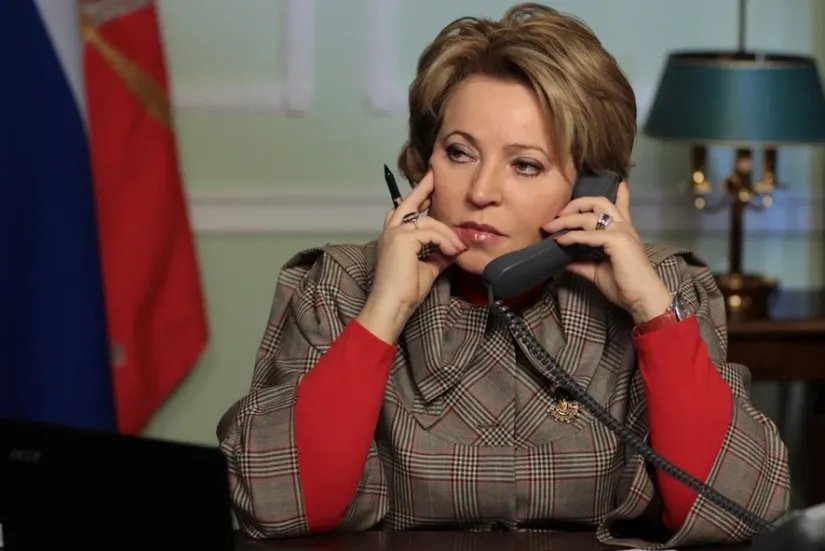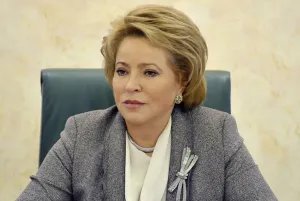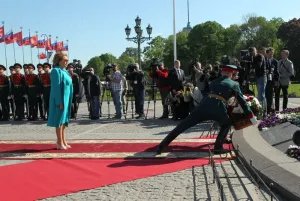Petersburg is a showcase for Russia
24 May 2013

Valentima Matvienko is a frequent author of the daily, however, this is her first interview in her capacity as the Speaker of the Federation Council and Chairperson of the IPA CIS Council.
Valentina Ivanovna, we are meeting on the eve of the Nevskiy International Ecological Congress. Tell us about your expectations?
Nevskiy International Congress is sponsored by the Federation Council together with the IPA CIS. Our official partner is UNIDO. The forum has a relatively recent history. It was first convened in 2008. Yet, today there is every reason to say that the Congress won general acclaim. Its growing esteem is supported by the fact of consistently high international attendance and the sixth straight year of existence. Another factor of success is that we, the sponsors and organizers, write its agenda based on the global set of environmental concerns and challenges as expressed in public policies and visions of international organizations. Judging by the good attendance this time around, we have made the right choice of the subject matter for the Congress of this year, which is Environmental Awareness as a Tool for Environmental Solutions.
There is a growing understanding that improving the state of the environment is impacted by individual choices and patterns of behaviour relevant to the environment. I am not making a point about the need of conservation – this is a staple of international discourse and a broad global consensus as fixed in international conference outcomes of the Rio-92 and Rio-2012. My point is that the reality of practical actions by governments, businesses and individuals does not match the language of declarations.
The gap between declaration and living practices in the sphere of the ecology is a stark reality. It is here to be seen by all, and there is a growing understanding that it requires something more than political and legal outcomes. These outcomes seem to be to a large extent dependent on what is known as environmental awareness. It is an understanding of our special relationship with nature overlayed by social and individual practical actions aligned to this understanding. Hence is the significance of EA as a remedy against environmental breakdown of our planet.
Bearing on this understanding, the Congress will discuss ways and means of achieving an environmental paradigm shift in the popular mindset and lifestyles, including new patterns of manufacturing and consumption. Various roundtables a range of subject matters, - bioeconomy and biotechnologies, innovations, disposal of industrial and household waste, the budding green economy. We will continue exchanging experience in facing these challenges, improving international cooperation, including throughout the CIS. The latter is especially relevant in the context of the CIS Year of Environmental Awareness and Conservation.
Where does environment stand in the agenda of the IPA CIS and its model law-making?
For a long period of time the CIS nations existed as a single entity. Hence the special need for model legislation. Over the twenty years of its existence, the IPA CIS adopted 400 plus model legal acts and other collective instruments. This fully applies to conservation. Model Ecological Code, model laws on Environmental Insurance, Ecological Expertise, Environmental Education, a series of model regulations in environmental governance. All this body of law found its way into national laws, including the law of the Russian Federation.
Legislative work related to the environment and other relevant branches of law is an continued activity and mainstream in the IPA CIS. The Long-term Plan of Model Law-making for the years 2011-2015, that governs our legislative routine, provides for 157 legislative texts to be drafted. In that figure is a good number of those that are related to the environment, resource management and conservation. They are a staple feature of our agenda.
The city community is particularly concerned over the proliferation of wildcat garbage dumps. Are there sensible options to counter this epidemic?
The growing mountain of household garbage and the sprawl of wildcat garbage dumps is a challenge that faces each and every country in the world. Russia is no exception. The country generates round 3billion metric tons of waste annually. Only one quarter of that amount is processed. The rest is burned or dumped at legal landfills and illegal dupps covering already an area of 2.5 thousand square kilometres.
So, where is the solution? First thing to do is to set the legal and administrative house in order in relation of the evacuation and storage of waste. Starker sanctions for violations, especially for wildcat dumps might be a first step. The draft of an appropriate act is currently read in the Douma. Next, comes the creation of incentives to process household waste followed by a third set of steps to achieve waste-free manufacturing and household practices. This where biotechnologies come into play. Their deployment and application will be center stage at the Congress.
May I note in passing that the Federation Council is actively debating these issues. In December 2012 they were discussed at the house Analytical Board. The Board adopted a document containing a set of specific proposals. It would be appropriate for me to thank the scientific community for expert support and cooperation.
27 May is the Day of St Petersburg, a festive occasion for locals and guests. What does it mean personally for you?
All my adult life, or the better part of it, is intimately connected with the City. I am a native of St Pete’s and its anniversary is like that of a close friend. A short statement for a big emotion. I will do all I can to come over to the banks of the Neva to be and celebrate with my city-sakes.
Every time you visit the City, you take time to meet your constituency. What is the feedback from these meetings? Are they really helpful to you, being a leader of the national calibre?
People are eager to learn more about the government and the way it works, about the motives, meaning and impact of the laws that we write. They want to make sure that their wisher and proposals are embedded in that body of law. This increases public trust. Being elected representatives of the public, we must adjust all our actions and plans to the wishes, preferences and expectations of the society. This is what makes democracy in action.
Meetings with the electorate is one of its elements. This is not only setting the record straight, as they say. This is also an act of public accountability. I will usually inform a meeting about the status of their requests, whether they are being worked on, or if not, what was the reason for a lack of action. I will typically tell them about my current and future legislative plans. Oftentimes I have to take on harsh criticism towards myself and the government in general. Yet, any public political leader simply requires such inputs to be effective. President Putin’s national stakeouts offer by far the best evidence to the practicability and efficiency of such connection with the public for the formulation of political decisions.
Modern communication technologies offer boundless possibilities to establish direct links and feedbacks with the electorate. The leadership of the Federation Council and each of its member supported the idea of a new web-site of the Federation Council and that of a parliamentary TV channel. These are not only technological gadgets, these are truly political instruments. We must learn to use them properly. This is our immediate task right now.
Petrodwellers expect advocacy of the City problems from their representatives at the Federal level, namely utility networks, transportation, especially the subway, sub-standard housing and so many other things. Can the senators from St Petersburg report success on any of the fronts?
Not for one minute I forget that I am representing the Governor of St Petersburg< the entire municipal executive, and as such I am permanently engaged with them in advocating the City’s needs at the Federal level. One such example is the Governors initiative to tighten sanctions for damage to the historical and cultural sites. I lent my support to his initiative. And the result was a set of amendments to the current regulations and its swift sailing through the Douma and the Federation Council. Whereas previously fine for such violations were negligibly small, today they are significantly higher, reaching millions of roubles for whoever dares to bring down a protected building under cover of night or during a weekend. This will make them pause.
I am going put of my way to collect moneys for the subway system. In 2012 we have had an allocation of one billion roubles from the Federal budget. It only too bad that there is no Federal program to support subway construction in the regions, only funds to maintain security in the system. From that program we received 337.1 m in 2011 and 55.4 m in 2012. This year we can expect only 645 m. This is not enough, but still quite an amount which enables the city to go on with its subway construction projects.
I am in permanent contact with the Ministry of sports to make sure our City receives adequate funds for the World Soccer Championship in 2018. The funds are needed for engineering and transportation projects, thereby releasing the municipal funds for the completion of the football arena.
St Peterburg is currently working on the program of conservation of the city’s historical center, long awaited by the public. It includes things that go beyond restoration of landmarks, like capital renovation of apartment houses that are still lacking modern amenities. As soon as the program is ready, we will forward it to the Federal Government for co-finansing. Preservation of St Petersburg as a unique historical cityscape is a monumental challenge that cannot be underwritten by city funds alone. Municipal budget will always fall short of the requisite resources. Yet, the City is a national showcase to be taken care of by the entire nation. The Federation Council will be fully supportive of this drive.
Your election to the Speakership of the Federation Council brought about a sea of change in the Chamber. The new law on the Rules of Appointment to the Membership of the Federation Council has entered into force. The membership is bound to radically change in the near future. Will this affect the efficiency of the Chamber?
The Constitution attributed many important functions to the Federation Council. At issue is the efficiency of its performance as a constitutional body. Our objective is to raise the standing and relevance of the Chamber, being as it is an institution that can make a difference in Russia as a federal state with its huge diversity cultures, nations and climates. Today, I have every reason to say that the drive was a success. Here I may give you an outline of the highlights:
The most notable change was the increased activity of the Council as a generator of legal texts. Today, all members are involved the commissions of the government that are working on the concepts of new laws thereby shaping the draft text at the very start. Then, we got closer together with sister committees of the Douma, again very early on, from the “zero” reading, to the concept paper and all the way to the advanced drafting. At the stage of the first reading, the Federation Council submits amendments and supplements to take care of omissions, regional or our own concerns. The outcome is that draft laws forwarded to our chamber from the Douma are not something unexpected or poorly understood, which eventually translates into better quality of legislation.
The Federation Council has come to be essentially, rather than declaratory, a chamber of the regions. Together with the Douma we have established a Conference of Legislators of the Russian Federation which gives voice to the regional parliaments and at the same time enables the FC members to make legislative proposals in the regional parliaments that they represent.
Issues of special interest to the regions are heard at parliamentary hearings with mandatory attendance by the region’s representative. All recommendations made are being followed-up. When needed, we ask the government or even the President to help us follow through on the implementation. The members of the Council are well aware that they are not there to talk the talk, but walk the walk. And I believe we live up to this responsibility.
There’s one more thing. Over time, the Council has accumulated quite a legacy of assorted expert bodies, many of which were dead wood. We’ve made an inventory of them followed by a trimming exercise. What was left, was totally rearranged in their terms of reference and accountability. Now, we have an advisory framework aligned to the real needs of the Chamber and supported by a roll call of leading researchers and analysts. This has been done as a response to real needs, rather than a PR reformationism. Our expert bodies are active contributors to our lawmaking.
The new law on the Rules of Appointment to the Membership of the Federation Council has entered into force. This law has relieved us from a powerful and justifies stream of criticism. A body of public opinion took hold that the FC is a gated paradise for the oligarchs, for the privileged uptown population of the capital city. The new law drastically reversed the stage. Now, here is a permanent residence requirement, meaning that only those effectively residing and having their center of interest in a given region may represent the region in the FC. To boot, they must have a popular mandate. The Chamber has a stable membership. Previously, members were appointed and recalled every six to twelve months on the average depending on the fancy of the Governor concerned. Today, this is history. Same rules apply as in regard to the members of the Douma. The result was a new face of the FC consisting of people of various walks of life. They are practitioners who know the situation on the ground in education, public health, business climate which helps produce quality legislation.
To be sure, the membership of the Chamber was impacted by the laws that impose certain restrictions on public officials and MPs. Originally, the law was a response to a public call for an accountable government. Anyone who holds a public position must have his assets working for the national economy, rather than fertilizing someone else’s. So far three FC members have relinquished their mandates. They acted strictly within the prescriptions of the law and made their personal choice.
After the effective date, the FC members will have three months to make up their minds. I expect two or three additional members to quit. No massive walkout though.
Last year during the Congress you planted several sibling trees in the Tavricheskiy Garden. How ere they doing? Did they take?
Oh! They did take very well, vibrantly green. This year, we deployed an open-air eco-theatre in the Tavricheskiy Garden. We collected some 150 eco-films from throughout the CIS and elsewhere. Our kids did a great job from the eco-ed center at the Vodokanal. This was their debut and a heartening success.
Interview by Alexander Rybkovskiy



